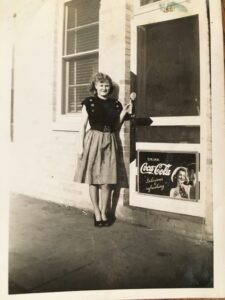After relocating to Chicago for work during the Great Depression, my parents eventually returned to Kansas to start a venture they had absolutely no experience in.
This was running the Avery Cafe on Wichita’s “Tractor Row,” a stretch of South Wichita Street that was home to dozens of businesses catering to the region’s farmers. The Row was located on some of the land where Century II and Price Woodard Park now sit.
My dad’s brother, Ted Breit, was successfully running the City Café on North Main near Third Street (across the street from Wichita’s original Post Office location). He convinced my dad, Paul, to buy the Avery Café.
Fortunately, the experienced cook — Elsie — stayed with them and she did know how to run a restaurant. My mom, Helen (Kisner), and sister became waitresses with white uniforms and fluffy handkerchiefs in the breast pocket — picture Flo in the Mel’s Diner TV show. My brother, who was in high school, became an occasional dishwasher. I was in grade school and too young to do anything except eat snacks and drink pop. After school I would often walk from Cathedral Grade School, at Central and Topeka, to the restaurant and wait for them to close up around or 2 or 3 p.m. and drive eight blocks to our home on south Wichita street.
The cafe was not fancy. It had a large U-shaped counter with round sitting stools. The only booth was in one corner, a pinball machine stood in another corner, and the jukebox in another corner with all the punchboard prizes on a shelf above it. Punchboards were gambling cards that let you win a prize after paying a certain amount (I can’t remember how much) to punch out a hole containing a tiny paper slip telling you if and what you won. I entertained myself watching customers punch hole after hole with the punch key. It became illegal in Kansas a few years before my parents sold the cafe. Later my mom told me they paid off their $4,000 home in less than a year partly thanks to the lucrative punchboards.
The Row employed lots of workmen who ate breakfast and lunch at our cafe. To name a few of the employers: John Deere Equipment; Massey-Harris Tractors (now Massey-Ferguson); Kansas Rebabbiting at 318 S. Wichita (next door to our cafe); and Southwest Grease & Oil, around the corner at 220 W. Waterman.
Foley Equipment was nearby and Paul Foley was a regular customer. The morning and afternoon rush hours were quite busy. We were never without customers. And I was rarely without entertainment. All the workers knew me, and I walked in and out of various businesses, watched the workers and even climbed onto a tractor in the Massey-Harris showroom. It had a key, so I started it up and scared everyone. They didn’t let me come in any more after that. If I did get bored, I walked eight blocks to our home.
One time, I fell asleep in the booth and my parents thought I had walked home, so they locked up and left. I woke up and found the place dark inside. Someone working next door heard me yelling and called my parents, asking, “Did you forget someone?”
One Sunday afternoon, my parents drove to West Street, which was a dirt road south of Kellogg at the time, because many of the farm equipment shops were buying land there to build and move their companies. They wanted my dad to also build and run a restaurant there. Dad wasn’t interested and sold our restaurant in 1955. Later, my parents bought a motel on south Broadway Street. That was back when south Broadway motels were quite respectable — but that’s another story.
Coffee cost a nickel at the Avery Café. This newspaper is even cheaper than that — it’s free. If you enjoy reading this paper, please support our advertisers because they — and your donations — are the main sources of income that allow us to continue publishing. We are grateful for whatever you can donate to help us out!
P.S. My column in our September issue about my family’s experiences during the Depression sparked responses from several readers. Lois emailed about growing up on a farm in Burns, Kan., after moving there from Andale. She was the oldest of eight children at the time. She is 93 now and has memories of her mom selling chickens to get money to buy groceries. When there was very little money, her dad would play poker, and he usually won since he was a good player.
Rhonda told me her mom took in ironing earning 10 cents a shirt. Bob said living in a city during the Depression was worse than being on a farm. His family didn’t have land for a garden, nor could they raise any animals to eat. When they couldn’t find work, they had to accept charity.
Diana Wolfe is treasurer of The Active Age’s board of directors. She can be contacted at dcwolfe2000@yahoo.com.










